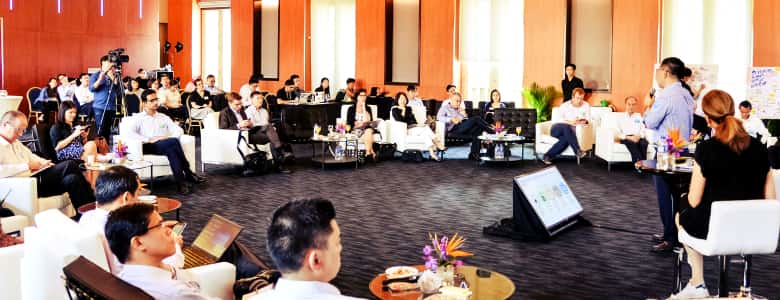Tech talent for the people

It all comes down to simple economics: when the demand for talent is high and supply is low, people with the right skills can command top dollar.
In fact, according to survey results published by employment website Glassdoor, the shortage of tech talent is so dire that even an intern at Facebook can command US$8,000 per month.
For countries seeking to transform the way the government provides services, the need for tech talent is felt even more acutely.
Not only does the government need to compete with the high starting salaries offered by sexy startups, it also needs to shed its image as rule-bound and slow to move.
The talent issue was a major concern at the second Digital Government Exchange (DGX), a two-day closed-door dialogue between government Chief Information Officers (CIOs) and public sector leaders around the world.
Held from 2-4 May 2017 at Singapore’s Asian Civilisations Museum, DGX 2017 was organized by the Smart Nation and Digital Government Office (SNDGO) and the Government Technology Agency of Singapore (GovTech).
Head of Singapore's Civil Service, Mr Peter Ong, delivered the opening address at DGX 2017. He also announced the launch of the API exchange (APEX), a centralised data sharing platform for government agencies developed by GovTech and the Ministry of Finance (MOF).
Mr Ong said: "A network of data “pipes and gates”, APEX lets agencies share data through secure application programming interfaces or APIs, while centrally monitoring and managing the security of these exchanges."
Buy, rent, or grow
Speakers on the first day of DGX shared their thoughts on getting the right talent to create and deliver digital government services.
Drawing from his experience as the Chief Technology Officer of the United Kingdom from 2012 to 2016, Mr Liam Maxwell said that governments have three main options when it comes to acquiring tech talent: buy, rent or grow.
Governments can ‘buy’ talent by hiring skilled professionals from industry. In other cases, they could ‘rent’ expertise by bringing in IT contractors. But for true transformation from within, the UK government has opted to ‘grow’ a percentage of its tech talent by training existing staff.
“In an organisation of 280,000, we’ve got about 30,000 civil servants working on digital and data preparedness projects. Of those, 39 percent are long-term civil servants who’ve elected to take part in the process of digital transformation,” said Mr Maxwell, who was appointed the UK’s first National Technology Advisor in 2016.
Potential future leaders of the civil service are sent on deep immersion courses at places like Silicon Valley to give them an understanding of the possibilities that technology enables, Mr Maxwell said.
Frontline staff, in the meantime, train to improve their service capabilities at academies run by the UK’s Government Digital Services.
Not for forever
More importantly, Mr Maxwell noted, the government needed to change its mindset that a civil service job was for life. While the strategy in the past may have been for every staff to stay on in the government with the eventual goal of becoming the CIO, this approach simply does not work for today’s tech talent.
“That way of thinking was the most off-putting thing for people we wanted to recruit, because people want to work in a dynamic environment, where being in the government is just part of their journey,” Mr Maxwell said.
“We found that the pay had to be reasonable, but we didn’t have to pay top dollar. What was important was making sure that we accommodated people and that they felt valued,” he said. “But the most important thing was to give them a sense of mission — people join us because they want to make a difference.”
Agreeing, Mr Lars Frelle-Petersen, Director General at the Danish Agency for Digitisation, added that their recruitment strategy has been to assure candidates that a job with the government is not necessarily for life, but good for their careers in the short term.
For example, the scale of government projects can be an attractive reason to join, he said.
“If they want to play with big toys they should come to the public sector, because that’s where the biggest toys are. What we do is try to sell the larger projects like our digital signature project, which is the biggest IT project in Denmark at the moment,” said Mr Frelle-Petersen.
Multiple paths to success
Unlike the UK, however, Denmark has opted to tap into the capabilities of the private sector rather than focus on developing tech talent in-house.
“We felt that we should not be building tech competencies ourselves but forming partnerships with the private sector,” said Mr Frelle-Petersen. “Other kinds of businesses like ICT companies and banks face similar tasks and similar problems.”
“It’s interesting how both the UK and Denmark have managed to achieve good government digitisation outcomes despite your differing approaches to the same problems,” said Ms Jacqueline Poh, Chief Executive of GovTech.
Singapore has taken yet another path, she said, by offering Singaporeans working in Silicon Valley a chance to use their skills to serve the country under the Smart Nation Fellowship.
Apart from plans to train 10,000 civil servants in digital capabilities over the next four years, the Smart Nation Fellowship is a scheme that allows top data scientists, technologists and engineers from academia and industry in Singapore and overseas to contribute to Singapore over a period of three to six months — without having to join the government full-time.
When we launched the programme a year or so ago, we received over 280 applications over a three month period.” she shared. "It’s been a great programme to give the Fellows a good flavour of working on technology solutions for the public, and hopefully inspire them to return to Singapore to contribute in their own way.”

